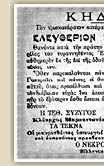
Recently the country had suffered terrorism and retaliatory tactics
on the part of the Venizelists who, recently in power, were avenging the persecutions they had suffered under their opponents in the
previous period.
Venizelos decided to hold elections in the hope of renewing popular confidence in and vindication of his policies. The war in Asia Minor continued, with the aim of consolidating Greek
diplomatic achievements. In the same period, the sudden death of King Alexander brought the dynastic issue to the fore once again. Admiral Pavlos Koundouriotis took over as Regent, provisionally,
while Venizelos's intention was for one of the sons of Constantine, Georgios or Pavlos, to ascend
the throne. Constantine's supporters insisted on holding a plebiscite for the
new king. Turmoil ensued, with slogans advocating ideas on dynastic and foreign policy. On the one hand, there was the United Opposition, the royalists, with the slogan 'a small but honourable Greece', promising the termination of war; and, on the other hand, there were the Liberals with the slogan
of a 'Greater Greece of the two continents and of the five seas',
which was already a diplomatic actuality, but required the pursuit of war in Asia Minor
to safegueard diplomatic gains.
|
 |

Wearied by war and anxiety for their loved ones, the Greeks embraced
the pacifist propaganda, thus depriving Venizelos of their vote of confidence.
Venizelos lost the election. The royalists, who were by now in government,
held a plebiscite which reinstated Constantine to the throne (December 1920): this fact afforded the Allies a pretext to disentangle themselves from all obligations towards supporting
Greece in her in her struggle in Asia Minor.
While the war in Asia Minor was pursued by a virtually isolated Greece,
severe economic problem plagued the country internally. Efforts to win foreign loans failed, while the onerous financial policy of Dimitrios Gounaris and the compulsory internal loans which the state was forced to raise halfed citizens' income. The military impasse, economic
breakdown and popular discontent were not resolved with the continuous changes in government,
which brought successively to Prime Ministership Dimitrios Gounaris, Nikolaos Stratos and
Petros Protopapadakis.
|
 |
